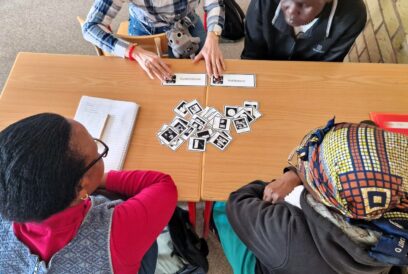

Learning in 1985, Germany. Photo: Akademie Klausenhof.
Learning in 1985, Germany. Photo: Akademie Klausenhof.
In his essay, Michael Sommer looks at the history of competences from the 19th century until today. Like all living beings, humans are learning organisms that must constantly build, expand and adapt their competencies.
“An old saw runs somewhat so: Man must learn while here below.”
Do you know the story of Max and Moritz? The German author Wilhelm Busch created it in 1864 (1). The verses and drawings are considered the first comic story and are still very popular in Germany today.
The story gives a good insight into everyday life in the 19th century. These standards also include learning: “Not alone the A, B, C / Raises man in dignity …”
The competences that are required here would today be attributed to basic skills: reading, writing, numeracy. In the spirit of the Enlightenment, wisdom is brought into play as an extension of competences (“But must hear with pleasure Sages / Teach the wisdom of the ages”).

Teacher Lämpel knew how to relax after a heavy working day. Photo: Wikipedia Commons.
In this story, the teacher called Lämpel also represents another competence that is much discussed today: He deliberately withdraws to relax (with his pipe), demonstrating that a good work-life balance and wellbeing are important components in life.
If we look at the historical context from the point of view of competence, we find ourselves in a time of noticeable awakening. Compulsory education is slowly becoming established, the Church and the aristocracy are becoming less and less important.
Continuation of the Enlightenment
However, social advancement through the improvement of one’s own competencies was possible during this time only for those who had access to the (petty) bourgeois milieu or to the various professions in crafts, medical care or, for example, administration.
This period also saw the development of adult education as popular education in today’s understanding as a continuation of the Enlightenment. Its topics ranged from basic education for the rural population to moral lectures or further technical training or languages (2).
As with the Danish Nikolai Frederik Severin Grundtvig as an important innovator of adult education in the 19th century, this was about a “school of life” where no fixed canon of subjects was taught, but also about a general strengthening and support of the people (3).
This example shows that, already in the 19th century, a contrary tendency towards vocationally oriented or moral-social adult education was developing. Today, one would speak of a holistic approach to competence development.
The biggest change in this period was urbanisation: until then, the majority of the population in the countryside were not only employed in agriculture but also in small factories (such as the weavers). With industrialisation, migration to the cities began. Special skills were not necessary for industrial workers.
Similar to agriculture, physical skills such as strength, endurance, forbearance and sometimes dexterity were required. In the countryside, women in particular had to have considerable management skills in order to organise the household and the many children under conditions of mostly great poverty (4).
Taking responsibility for life
In its current PISA study to identify competencies, the OECD assumes three categories into which key competencies can be divided (5): First, people should be able to use different media, aids or tools such as information technologies or language effectively. Second, they should be able to deal with people from different cultures and interact within socially heterogeneous groups. Third, people should be able to take responsibility for shaping their lives, to situate their lives in the larger context and to act independently.
Of the competencies that can be identified as relevant in the 19th century, the category “dealing with tools” can be found above all. Some 150 years ago, many new technologies appeared in agriculture, handicrafts and manufacturing, which made work much easier thanks to steam engine technology, e.g., the first tractors or threshing machines. The use of these tools had to be mastered in a short time.
At that time, we experienced a technical revolution comparable to today’s digitalisation where the tools (computer, smartphone, software, etc.) must also be learned.
The category “responsibility for shaping one’s life”, including responsibility for social and political conditions, is slowly becoming visible in this period. This includes, for example, the ability to engage politically and socially, which is evident, for example, in the emerging women’s movement. This category also includes learning skills that are useful for personal professional and general development, such as language skills, cultural competences (music, art, literature).
Education for all
While in the 19th century the improvement of individual competence for career advancement or personality development was only accessible to a minority, a hundred years later we are experiencing the opposite: “Education for all” is now the motto. Thus, there is a clear strengthening of life-shaping skills. The ability to “deal with tools” remains just as relevant.

Learning in 1975, Germany. Photo: Akademie Klausenhof.
A new aspect is communicative competence, which is becoming relevant due to the development of heterogeneous societies and globalisation. This skill is becoming more and more important today, especially in the course of digitalisation.
Dealing with digital technologies and content can basically be assigned to the competence area of “tools” – learning new technologies for work and everyday life has been a necessity at least since the industrial revolution in the 19th century.
New fields of competence are currently emerging with new technologies and developments, such as AI competence, data literacy competence or climate literacy competence (6). What was hardly conceivable for people in the 19th century or even 50 years ago is the speed with which competence requirements are developing.
From the perspective of learning theory, there is a threat of competence overkill. The modern way of life can apparently only be mastered if one has a barely countable number of competences at one’s disposal.
Even with every purchase in the supermarket, many competences are required today (e.g., knowledge of global interrelationships, of economic processes, ecology and species protection, health, global warming and climate protection, social responsibility). Does buying a pineapple promote exploitation in poor countries? Does it accelerate global warming? Are the shop assistants at the cash register well paid?
Therefore, meta-competences, i.e. the ability to develop and apply self-organised problem-solving skills, are now crucial. The most important meta-competence is probably known to everyone: Lifelong learning.
Bibliography:
(1) More information: https://blogs.bl.uk/european/2015/12/two-bad-boys-seven-pranks-and-one-childrens-classic.html. Full German text and English translation: http://www.davidgorman.com/maxundmoritz.htm
(2) Wolfgang Seitter: Geschichte der Erwachsenenbildung. Eine Einführung. WBV 2007
(3) Arthur Macdonald Allchin: N. F. S. Grundtvig. An Introduction to his Life and Work. Århus University Press 1997
(4) Wilhelm Abel: Agrarkrisen und Agrarkonjunktur in Mitteleuropa vom 13. bis zum 19. Jahrhundert. Hamburg/ Berlin 1979
(5) Dominique Simone Rychen and Laura Hersh Salganik (eds.): Key Competencies for a Successful Life and a Well-Functioning Society. Göttingen 2003
(6) See the articles in Elm Magazine, http://elmold.localhost/future-of-literacy/future-of-literacy-diverse-and-complex/
Author







